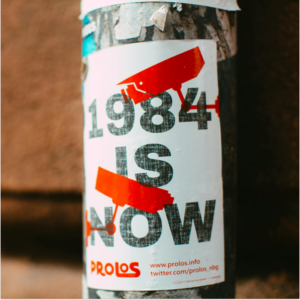18-year-old Maria Mitko on how dystopian fiction mirrors our world today and why that’s terrifying

‘We're being watched more than we think, thanks to modern technology.’
Picture by: Markus Spiske | Pexels
Article link copied.
April 11, 2025
Is 1984 happening again? Why we should heed dystopian warnings

The relevance of dystopian novels in the world today is frightening and devastatingly upsetting. Current political and social landscapes bear an unbelievable resemblance to some of the greatest pieces of literature. Are we living out dystopian predictions?
A dystopia, a typically totalitarian or post-apocalyptic society where there is great suffering, is a theme in literature used by some of the most prominent writers of all time. To really understand how it plays into society nowadays, it’s crucial to understand its key elements.
Harbingers’ Weekly Brief
A government of such a society wishes to completely control its citizens, their behaviour, thoughts and feelings. This is made evident in George Orwell’s 1984 (published in 1949), in which “Big Brother” and the “Party” use various forms of crowd control to subjugate society. The government of Britain, part of the totalitarian superstate Oceania, uses fear and constant surveillance to instil their ideology in people’s minds. The idea of being watched and spied on every single moment of every single day is so frightening, all thoughts against those in power cease to exist.
Orwell wrote 1984 a few years after World War II as a cautionary tale against totalitarianism and set the story in London to illustrate that if the problem isn’t addressed properly, such a regime could emerge everywhere.
While we may not realise it, we’re being watched more than we think, thanks to modern technology. There are more than one billion CCTV cameras in the world today, including 85 million in the US and 600 million in China. London is one of the most surveilled cities in the world, with around half a million cameras.
In most countries the situation with government control is not as drastic as Orwell describes, but there are some worrying examples.
It is well known that North Korea is the world’s most authoritarian country, with constant surveillance and brutal repression. Its citizens are prohibited from leaving the country without the government’s permission and face severe penalties for breaking any law. There is extreme censorship with no internet connection and only government-approved television and radio channels available.
Orwell also wrote Animal Farm (1945), a short novel depicting a totalitarian society, set on a farm. The pigs (who symbolise the totalitarian government) gain more and more power, eventually taking over the other animals without their awareness of it. At one point, the pigs write on the wall of the stable: “All animals are equal, but some animals are more equal than others.”
Trump’s bigotry and ignorance show that we are in danger of going back to the 19th century, to the days of blatant discrimination against others.
One of the lesser talked-about elements of a dystopian society is money, which equals power. Having more money means having privilege, and in a world that’s drowning, it means staying afloat.
In her dystopian trilogy The Hunger Games (2008–2010), US writer Suzanne Collins divides society into 12 districts, based on how much money a person has and what their job is. The closer the districts are to the government (the Capitol), the more prosperous they are.
This is worryingly similar to how much power Elon Musk,the world’s richest man with an estimated net worth of over $340bn, seems to have, especially since Trump’s return to the White House this year. He spoke during Trump’s inauguration and seems to have a big influenceon how the US president governs the country.
In 2021, Musk said he could end world hungerif someone made a plan to do it for under $6bn. The United Nations World Food Program came upwith that plan, but he decided to put the money into his foundation instead.
Of course, a major element of dystopian fiction is the revolution and the need to protest against the totalitarian government. This is evident in 1984, when the protagonist Winston Smith does all he can, no matter how small the action, to show his defiance of the Party. In The Hunger Games, Katniss Everdeen, the narrator and key character, leads the revolution to overthrow the Capitol and those benefiting from others’ misfortune.
However, the revolutions described in books tend to be glamorous and romanticised and their leaders usually survive. This is not how it is in the real world, where revolutions are brutal and violent, lead to many deaths and are often unsuccessful.
Two days after the elections in Georgia, a country in eastern Europe, on October 28 2024, the first wave of protests against the result, which were thought to be filled with irregularities, started. The second wave hit when the government announced its plan to stop EU accession talks. Just in the first week of the second wave of protests police are said to have used excessive force, resulting in the injuries of around 140 people.
We are heading, dangerously, towards a dystopian world, where people are entirely controlled by the government and the rich. The similarity between the literary world and our society is what makes dystopian books so relevant, but also frightening.
We need to educate ourselves and others through examples, such as the works of Orwell and Collins, and make better choices than those who came before us. As The Hunger Games warns us: “Stupid people are dangerous.” Ignorance isn’t harmless – it’s a threat.
Written by:

Human Rights Section Editor 2024
Warsaw, Poland
Born in 2007, Maria lives in Warsaw, Poland, where she attends Witkacy High School and prepares to study English Literature.
Maria joined Harbingers’ Magazine in late 2023 after winning the Women’s Rights Essay Award.
Maria’s journey has been remarkable: starting as a writer, she quickly demonstrated her dedication, creativity, and leadership, leading to her promotion to a section editor. In May 2024, she launched Harbingers’ Women’s Desk,a section of Human Rights, where she commissioned and edited articles from young journalists worldwide.
She also led Harbingers’ Armenian Newsroom,mentoring five forcibly displaced girls from Nagorno-Karabakh (Artsakh) in journalism.
In her free time, Maria volunteers at a public library where she organises a board game club. She loves listening to music, reading good books and watching movies. Maria’s favourite animals are dogs, of which she has two – Rudolf and Charlie.
Edited by:

🌍 Join the World's Youngest Newsroom—Create a Free Account
Sign up to save your favourite articles, get personalised recommendations, and stay informed about stories that Gen Z worldwide actually care about. Plus, subscribe to our newsletter for the latest stories delivered straight to your inbox. 📲
© 2025 The Oxford School for the Future of Journalism


